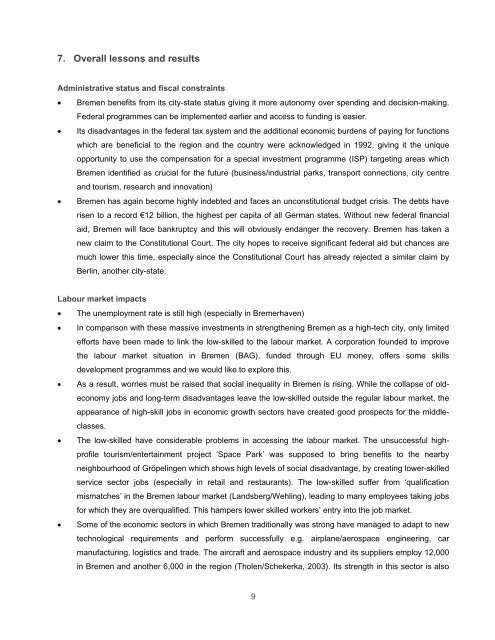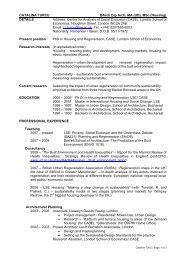Case Study 3: Bremen's Innovation Policy - STICERD
Case Study 3: Bremen's Innovation Policy - STICERD
Case Study 3: Bremen's Innovation Policy - STICERD
Create successful ePaper yourself
Turn your PDF publications into a flip-book with our unique Google optimized e-Paper software.
7. Overall lessons and results<br />
Administrative status and fiscal constraints<br />
• Bremen benefits from its city-state status giving it more autonomy over spending and decision-making.<br />
Federal programmes can be implemented earlier and access to funding is easier.<br />
• Its disadvantages in the federal tax system and the additional economic burdens of paying for functions<br />
which are beneficial to the region and the country were acknowledged in 1992, giving it the unique<br />
opportunity to use the compensation for a special investment programme (ISP) targeting areas which<br />
Bremen identified as crucial for the future (business/industrial parks, transport connections, city centre<br />
and tourism, research and innovation)<br />
• Bremen has again become highly indebted and faces an unconstitutional budget crisis. The debts have<br />
risen to a record €12 billion, the highest per capita of all German states. Without new federal financial<br />
aid, Bremen will face bankruptcy and this will obviously endanger the recovery. Bremen has taken a<br />
new claim to the Constitutional Court. The city hopes to receive significant federal aid but chances are<br />
much lower this time, especially since the Constitutional Court has already rejected a similar claim by<br />
Berlin, another city-state.<br />
Labour market impacts<br />
• The unemployment rate is still high (especially in Bremerhaven)<br />
• In comparison with these massive investments in strengthening Bremen as a high-tech city, only limited<br />
efforts have been made to link the low-skilled to the labour market. A corporation founded to improve<br />
the labour market situation in Bremen (BAG), funded through EU money, offers some skills<br />
development programmes and we would like to explore this.<br />
• As a result, worries must be raised that social inequality in Bremen is rising. While the collapse of oldeconomy<br />
jobs and long-term disadvantages leave the low-skilled outside the regular labour market, the<br />
appearance of high-skill jobs in economic growth sectors have created good prospects for the middleclasses.<br />
• The low-skilled have considerable problems in accessing the labour market. The unsuccessful highprofile<br />
tourism/entertainment project ‘Space Park’ was supposed to bring benefits to the nearby<br />
neighbourhood of Gröpelingen which shows high levels of social disadvantage, by creating lower-skilled<br />
service sector jobs (especially in retail and restaurants). The low-skilled suffer from ‘qualification<br />
mismatches’ in the Bremen labour market (Landsberg/Wehling), leading to many employees taking jobs<br />
for which they are overqualified. This hampers lower skilled workers’ entry into the job market.<br />
• Some of the economic sectors in which Bremen traditionally was strong have managed to adapt to new<br />
technological requirements and perform successfully e.g. airplane/aerospace engineering, car<br />
manufacturing, logistics and trade. The aircraft and aerospace industry and its suppliers employ 12,000<br />
in Bremen and another 6,000 in the region (Tholen/Schekerka, 2003). Its strength in this sector is also<br />
9



